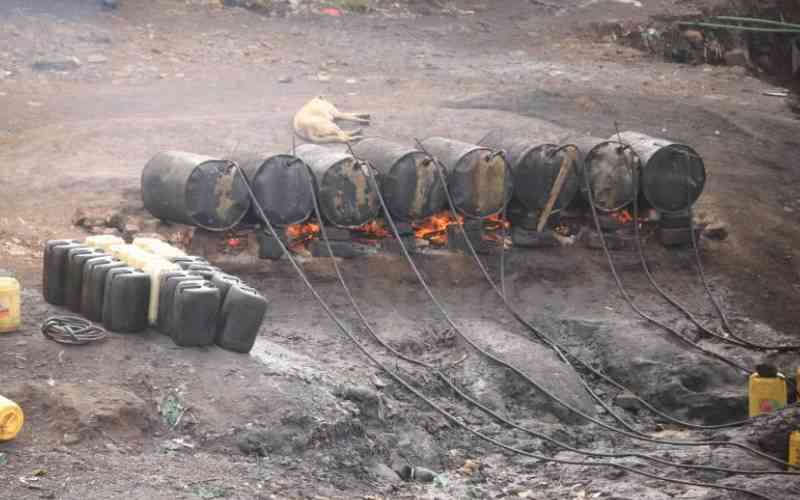 |
|
The making of new handbags has lifted three single mothers from poverty. Inset: Phoebe Akinyi with a table mat made form waste paper.[PHOTOS: JAMES WANZALA] |
By JAMES WANZALA
What do you do with a juice packet after drinking the juice? Probably, you throw it into a dust bin to be collected by garbage collectors.
But a group of three women in Mathare North, Nairobi County, is turning the waste juice packets into lucrative business. The innovation is resulting into durable and eco-friendly handbags.
“Initially we were twenty women but some quit saying the production work was tiresome.
Slum project
We decided to soldier on and that’s why we are only three,” said Phobe Akinyi Owour, the trainer and production manager during the interview at their fist floor factory.
Handbag making is a project within the Mathare Children Fund Panairobi (MCFP), a Community Based Organisation (CBO) that operates in Mathare North.
It sponsors destitute children from primary up to university within Mathare and the surrounding slums. “We saw it wise to start an income generating activity for the children’s mothers last year, most of whom are single mothers,’’ said Jophinta Abuoga, a social worker at the MCFP.
“It will benefit them by enabling them to earn income through handbag making.” Like an idea whose time has come, the making of handbags using waste juice packets came from the children at the centre. This was after discovering that bags did not necessarily have to be plastic. While the plastic bags are made from plastic material, their handbags are made from Delmonte, Orchid Valley, Afya, and Pick N Peel waste packets.
The process involves collecting the waste packets from homes, hotel dustbins and dumpsites. They wash them thoroughly.
They then cut them longitudinally with a paper cutter.
After cutting, the waste paper is sorted according to similarities in colour and then stitched with clear cello tape into different lengths according to the size of handbag being made. The stitching, which involves lining, zipping and strapping, is done by sewing machine.
The process is 90 per cent manual and only 10 per cent mechanised. In a day, Phoebe says they make about three bags with one bag taking about two hours to complete.
However, despite the project being less profitable due to lack of ready market and poor perception about the materials used, Phoebe says the handbag project has turned her life around.
“Locally, the market is dull. It is not like overseas where donors visit the centre once in a while and buy the bags in larger quantities,’’ says Phoebe, a single mother of six.
Stay informed. Subscribe to our newsletter
Recently during an exhibition sale at Kencom Building, she only managed to sell two handbags. Despite this, she is optimistic that people will soon appreciate their innovation and buy more handbags. One handbag locally goes for Sh1,000 and Sh,500 abroad.
More sales
The CBO is planning push the product for sale in supermarkets and other retail shops to increase turnover. Phoebe wants Kenyans to promote the group by buying their products under the ‘Buy Kenya and Build Kenyan’ clarion call.
But hard work comes with its own challenges. Phoebe cites the sourcing of used juice packets to be key among the challenges.
“Some homes and hotels are not willing to give us the waste packets. Some want to know what we were going to do with them and even request some money from us,’’ she told Business Beat.
“Street children at the dumpsites also stop us from taking the packets and demand cash from us.” She observed that increased demand for fresh blended juice has made sourcing waste packets a nightmare. These, coupled with poor opinion on the waste material used has reduced their projected sales.
Also the sewing machines they use to finish the handbags are another challenge since they have to use huge industrial machines. This means that they have to pay for the machines, which pushes up their production costs.
Durability
Phoebe says their handbags can last up to a year or even more if well maintained.
They only requires wiping with a wet cloth and are waterproof if rained on.
They are also eco-friendly since they are made using recycled material. The group has diversified the use of packets by making table mats. They also sell the bottle tops from the discarded juice packets.
To Phoebe, handbag making has helped her pay rent, and buy food and clothes. It has also helped her hone her skill and and at the same time, train others in the craft. Phoebe to sell porridge but now she does it on a part time basis to supplement her income.
 The Standard Group Plc is a
multi-media organization with investments in media platforms spanning newspaper
print operations, television, radio broadcasting, digital and online services. The
Standard Group is recognized as a leading multi-media house in Kenya with a key
influence in matters of national and international interest.
The Standard Group Plc is a
multi-media organization with investments in media platforms spanning newspaper
print operations, television, radio broadcasting, digital and online services. The
Standard Group is recognized as a leading multi-media house in Kenya with a key
influence in matters of national and international interest.
 The Standard Group Plc is a
multi-media organization with investments in media platforms spanning newspaper
print operations, television, radio broadcasting, digital and online services. The
Standard Group is recognized as a leading multi-media house in Kenya with a key
influence in matters of national and international interest.
The Standard Group Plc is a
multi-media organization with investments in media platforms spanning newspaper
print operations, television, radio broadcasting, digital and online services. The
Standard Group is recognized as a leading multi-media house in Kenya with a key
influence in matters of national and international interest.










